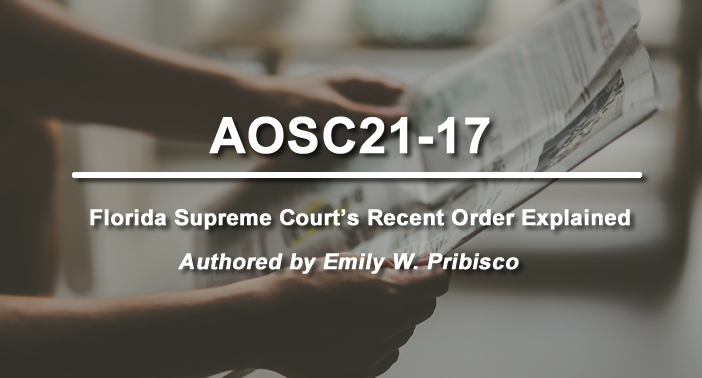It will take quite a while for life as we know it to get back to normal. While we settle into the new “normal” in our personal lives, our professional lives in and outside the Courtroom are also slowly starting to look familiar. At the pandemic’s height last Spring, the Florida Supreme Court effectively shut down live Court appearances for anything that was not deemed essential or an emergency proceeding. For most civil practitioners, the shutdown has resulted in nostalgia for the days when a Court appearance took more than clicking a zoom link and ensuring your microphone was muted.
The Florida Supreme Court’s most recent administrative order, AOSC21-17, issued on June 4, 2021, allows our courts to start opening back up in a way that is more familiar with our pre-masked appearances. What has not changed from this Order as compared to its predecessors is deference to superseding legal authority or the discretion of a chief judge when it comes to masking and distancing. However, the most recent Order eliminates the requirement for masks and now only encourages them. That is, so long as a chief judge doesn’t require the practices. This doesn’t mean that attorneys and their civil clients will be convening in the hallways outside of the courtroom as in years past. Civil court proceedings are still very low on the priority list for bringing litigants and their attorneys back into the courthouse. Rather, the emphasis on utilizing technology to facilitate remote notarization, depositions, hearings and even jury trials remains in full swing.
Even though it may seem as though civil litigation cases are taking a back seat to all of the other spinning wheels of our justice system, the Order encourages outside the box approaches to utilize wasted courthouse space, and even reassigning judges and court staff in order to clear the COVID backlog of cases. By clearing the backlog, the status quo of unfettered in-person access to the courts can be restored.
While the in-person proceedings may currently be monopolized by most non-civil proceedings, the Order reiterates the high court’s prior command to all chief judges to issue an administrative order effective April 21, 2021, which seeks to maximize the probability that civil cases will move efficiently through our pandemic era court system. The Civil Case Management Order must determine whether a civil case is complex, streamlined, or general. This categorization helps to reduce the strain on court resources by streamlining the less complicated and lower stakes cases towards an expedited resolution and allowing complex cases to effectively run as would have been otherwise permitted by Florida Rule of Civil Procedure 1.201. The Florida Supreme Court seems to be reminding all Chief Judges that the Civil Case Management Order is the lifeblood of the push to restore normalcy to our court system. By specifically setting forth deadlines for responsive pleadings, Pre-trial motions, discovery, expert disclosure and mediation, the “streamlined” and “general” civil case will be on a track to resolution rather than the waiting room.
With the emphasis on allocating in-Person and court resources to the highest priority and most complex cases, the Florida Supreme Court has provided a hopeful light towards making regular court appearances less of a novelty and more of a reality.


